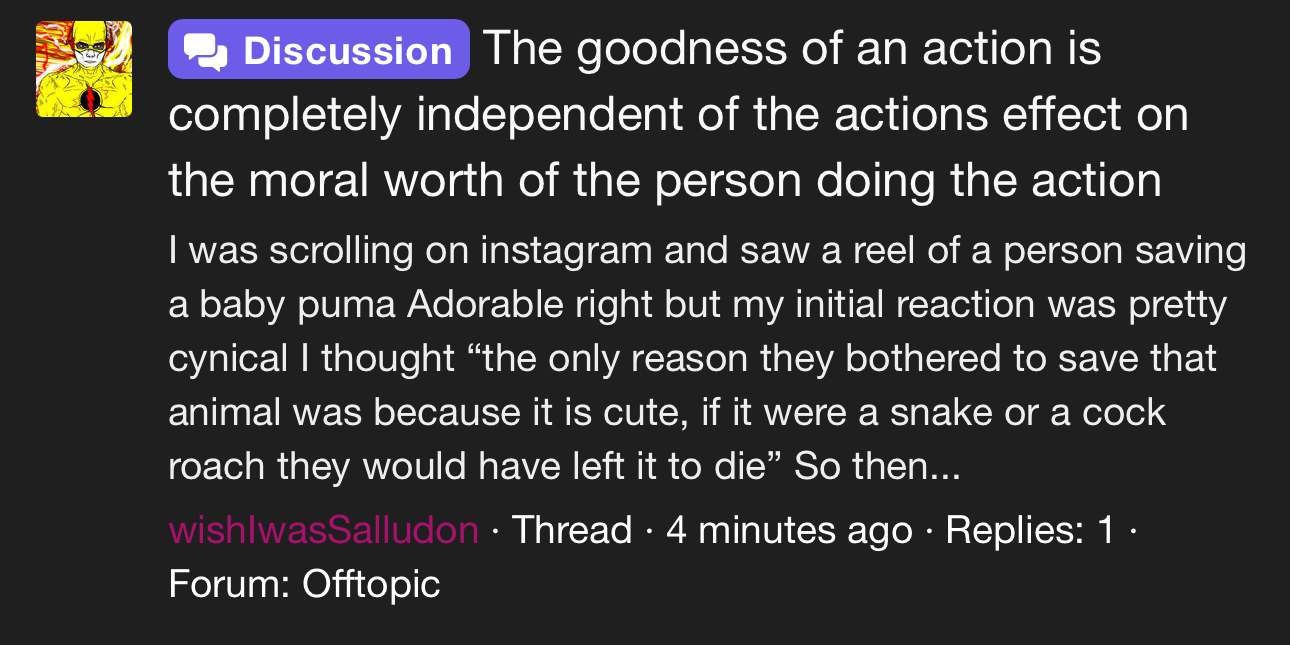wishIwasSalludon
broken but not destroyed
- Joined
- Nov 9, 2023
- Posts
- 30,243
- Reputation
- 52,452
I was scrolling on instagram and saw a reel of a person saving a baby puma
Adorable right but my initial reaction was pretty cynical
I thought “the only reason they bothered to save that animal was because it is cute, if it were a snake or a cock roach they would have left it to die”
So then I had to ask myself was what that person did really “good”
It basically boils down to one question, does intent matter?
The answer is that intent matters for determining the effect on the moral worth of the person but it is Independent of the goodness of the action itself
For example
Take scenario 1:
Person A by all accounts is a morally “average” person they then wake up and decide for some reason to go take a knife, go outside and stave person B to death.
Now let’s say it turns out that person B was actually in the future going to become a super villain who ends the world and makes humanity go extinct
Was the action of killing person B good? The answer is absolutely yes, person A literally saved the world.
But we all at the same time know that the fact person A decided to do this makes them morally reprehensible
Let’s do another example but the opposite to further drive the point down.
Scenario 2:
Person C is by all accounts a morally “average” person
Person C for whatever reason go outside and enters a delirious state which causes him to hallucinate that another person(let’s call them person D) has a firearm and is killing people in the street.
Person C sees this and takes a knife and stabs person D to death.
Person D in reality is innocent, so we can all agree that the action of killing person D is bad.
And yet can we truly say that person C is evil for this? I don’t think we can rationally say he is. In fact it shows that he has excellent moral character he was just misguided.
Conclusion:
So in both scenarios the conclusion is clear, intent does not matter in determining whether an action is good or not but does matter in determining the effect on the persons moral worth
So someone can do a good thing but that action makes them less good of a person, while someone can do a bad thing but you can argue that makes them more good of a person.
Thoughts?
Where have I gone wrong
@imontheloose @Mainlander
Adorable right but my initial reaction was pretty cynical
I thought “the only reason they bothered to save that animal was because it is cute, if it were a snake or a cock roach they would have left it to die”
So then I had to ask myself was what that person did really “good”
It basically boils down to one question, does intent matter?
The answer is that intent matters for determining the effect on the moral worth of the person but it is Independent of the goodness of the action itself
For example
Take scenario 1:
Person A by all accounts is a morally “average” person they then wake up and decide for some reason to go take a knife, go outside and stave person B to death.
Now let’s say it turns out that person B was actually in the future going to become a super villain who ends the world and makes humanity go extinct
Was the action of killing person B good? The answer is absolutely yes, person A literally saved the world.
But we all at the same time know that the fact person A decided to do this makes them morally reprehensible
Let’s do another example but the opposite to further drive the point down.
Scenario 2:
Person C is by all accounts a morally “average” person
Person C for whatever reason go outside and enters a delirious state which causes him to hallucinate that another person(let’s call them person D) has a firearm and is killing people in the street.
Person C sees this and takes a knife and stabs person D to death.
Person D in reality is innocent, so we can all agree that the action of killing person D is bad.
And yet can we truly say that person C is evil for this? I don’t think we can rationally say he is. In fact it shows that he has excellent moral character he was just misguided.
Conclusion:
So in both scenarios the conclusion is clear, intent does not matter in determining whether an action is good or not but does matter in determining the effect on the persons moral worth
So someone can do a good thing but that action makes them less good of a person, while someone can do a bad thing but you can argue that makes them more good of a person.
Thoughts?
Where have I gone wrong
@imontheloose @Mainlander




